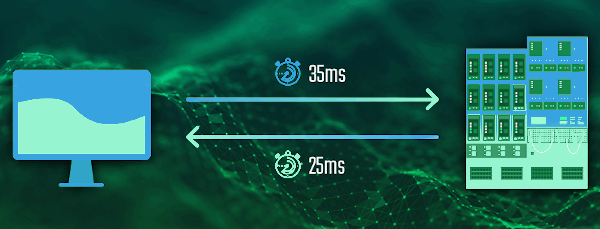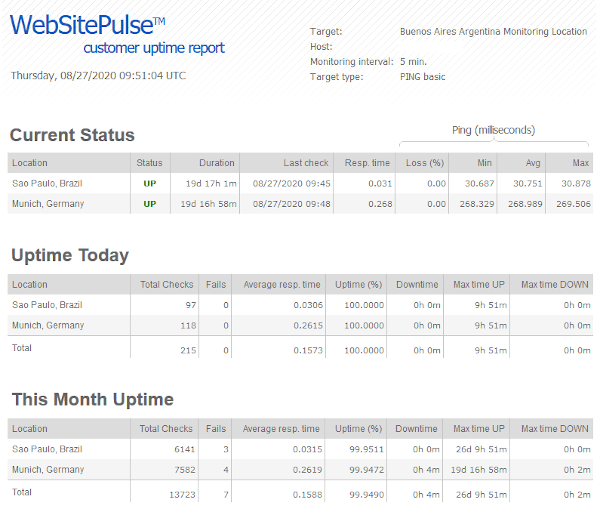
Managing a device network comes with various challenges covering everything from security to speed. Some of these challenges can be made easier through the use of ping monitoring services or software.
Ping monitoring is the act of pinging a device (assessing the time taken for ICMP protocol packets to be delivered to the target host and returned) regularly. You get an alert if there's no response or a later response than expected. This time is usually very fast, measured in milliseconds.
If there's no response, you know the system is off. If there's a delayed response, you know something is affecting the speed. Here are five reasons you should use ping monitoring software /service to manage your device network.
Uptime Monitoring and Recording
It's impossible to manually keep an eye on the uptime you're experiencing, especially if your network operates over multiple sites or countries. Ping monitoring software can automatically check on a set schedule from multiple sources.
Recording your uptime rate can be a great way to market your services. For instance, if one of your services is a phone system for small business, being able to boast about a 99.79% uptime over the last year is a great selling point.
This uptime monitoring can also reduce the number of incoming support queries by allowing you to provide a status page.

A status page, like the one above, allows your customers to check in and see whether issues are on your end or theirs, and this is something you can only actively achieve through automatic uptime monitoring.
Device Availability
As well as checking uptime, you can ensure specific devices on your network are available. Rather than manually going to the site and checking to see if it's switched on, you can look at your ping monitoring system and see if it's getting a response. If it is, then you know it's connected and available. If not, then you know it isn't.
This is particularly beneficial for sites with many devices connected to a network - server rooms, point-of-sale systems, or security cameras. It's also helpful in managing specific departments as a remote sales team. If someone from the team calls IT and says they're having issues receiving calls, ping monitoring can help you find the source of the problem. It gives you a useful starting point that means things can be resolved quickly - saving you both time and money.
Many countries and businesses have certain levels of compliance required to be legally sound. Ping monitoring service can allow you to monitor device availability and ensure you meet regulatory requirements.
Alerts From Anywhere
Most businesses are spread over multiple locations, something only complicated further by the rise of remote working. IT can't keep an eye on everything manually, but ping monitoring can help.

Rather than manually checking ping for each network and device and checking if it's within the right parameters, you can set the software to send alerts when certain conditions are met. This means your IT department can be immediately aware of any issues and take action to resolve them.
It's also useful as it allows you to roll out temporary solutions while the issue is fixed. For instance, if your phone lines go down, you can reassign agents to live chat and post updates directing customers there on your social media and your status page.
Improved Security
Every network has security risks, growing with every new device you add. This is especially relevant if you're using something like VoIP for home, as people will be using their home network and devices. No amount of password updates can make up for the possibility of lax anti-virus software or downloading something they shouldn't.
While ping monitoring alone is not a security solution, it's undoubtedly part of one. Things like DDoS attacks can be visualized, and you can see exactly how and where they impacted your network. This is particularly helpful for determining why one may have happened and if it was targeted specifically at you or if you were a side-effect of an attack on one of your hosts.
Combine this with other software like firewall monitoring tools and intrusion detection services, and you'll have a robust suite of software designed to protect you from potential security issues.
Increased Profits
Ping monitoring service does require a monetary investment - but that's money you'll get back in the long run. All of the above reasons combine to create a reliable and resilient network, which is something your clients and customers want.
When looking into new products, customers - especially business customers - need to know it's reliable. If they're searching for a successful VoIP system or cloud file storage, they'll discard anyone who can't show evidence of their reliability. Equally, if they have already signed up with you, they may cancel if they encounter a lot of downtime or a lack of access to certain devices.
Rather than waiting for clients to come and then seeing what issues arise, ping monitoring allows you to do proactive (or synthetic) monitoring. This is where the software emulates the behavior of potential customers. For instance, if you're an e-commerce store, it can trace the path a customer might take. By monitoring the responses on the landing page, product page, and during checkout, you can pre-empt any potential issues you might have. That means you won't lose customers while you perfect your storefront.
Even if your website isn't down, it might be slow. A slow website can send your potential customers somewhere else - losing you money. Regularly monitoring and maintaining your website guarantees a good customer experience, making customers more likely to stay and explore.
Final Thoughts
If you hadn't considered the importance of ping monitoring before, hopefully, this has persuaded you! It's a quick and easy way to keep an eye on your network's uptime and your devices' availability, with the added benefits of helping increase security and profits.
Investing in a ping monitoring service means you can get regular alerts on problems before your customers notice them - and it reduces the workload of your IT department. That way, they can focus on improving things rather than just maintaining them. With benefits for both your staff and your clientele, it's definitely a worthwhile investment.


 Copyright 2000-2026, WebSitePulse. All rights reserved.
Copyright 2000-2026, WebSitePulse. All rights reserved.